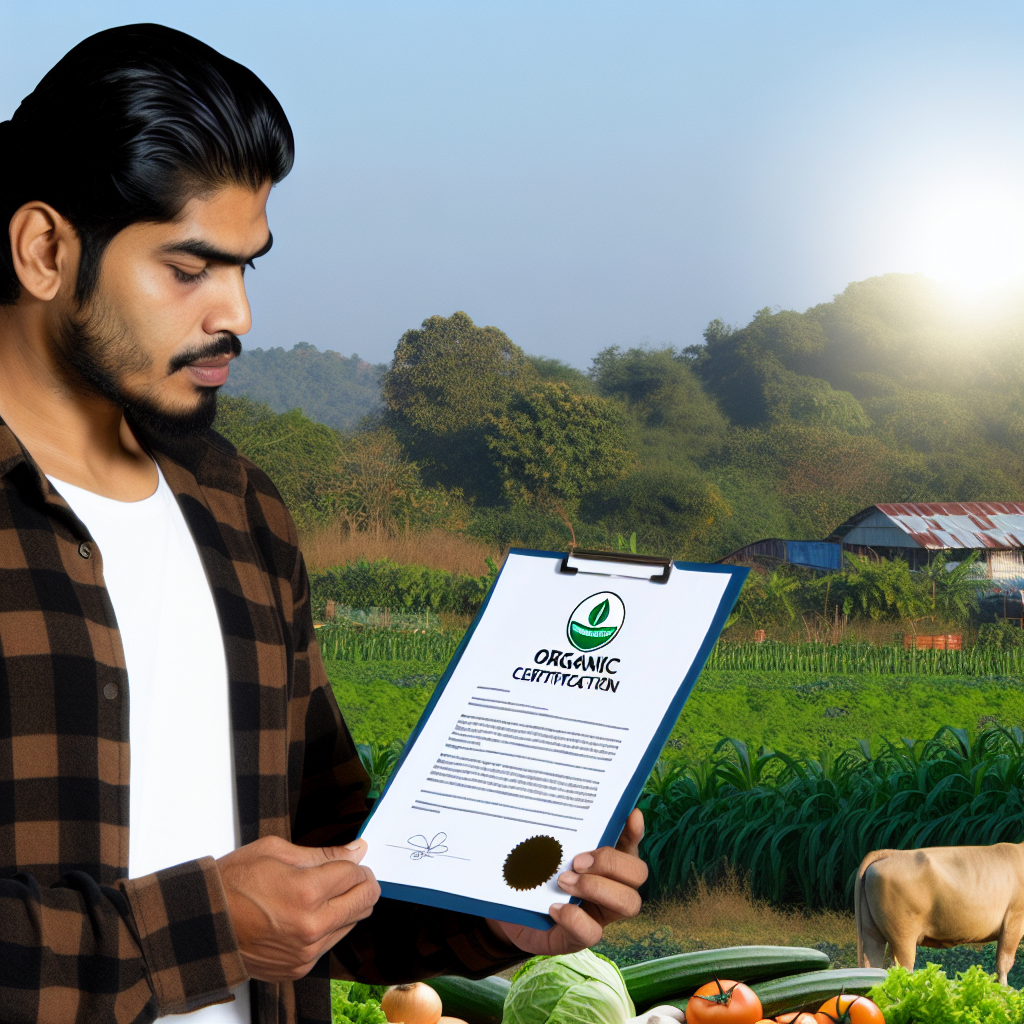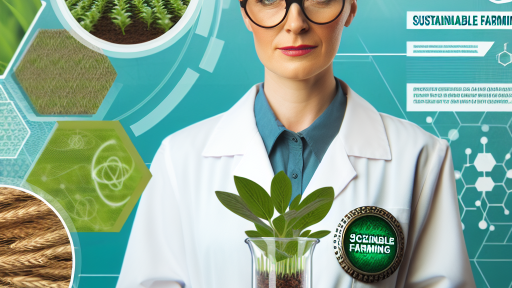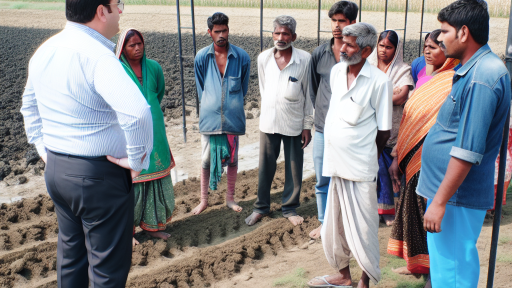Introduction to Organic Certification
Definition of Organic Certification
Organic certification validates farming practices that align with organic standards.
This certification ensures products are grown without synthetic fertilizers or pesticides.
Furthermore, it emphasizes the sustainable treatment of the environment.
In general, it promotes biodiversity and ecological balance.
Importance of Organic Certification
Organic certification enhances consumer trust in food products.
It allows consumers to make informed choices about their food sources.
Additionally, it supports farmers in adopting environmentally friendly practices.
Consumers increasingly seek certified organic products in stores.
Consequently, this demand drives market growth for organic goods.
Benefits of Organic Farming
Organic farming improves soil health through natural processes.
This method reduces the risk of chemical runoff into water systems.
Moreover, it fosters diverse ecosystems on farms.
Farmers benefit from premium prices for organic produce.
Thus, organic certification supports both environmental and economic sustainability.
Overview of Sustainable Farming Practices
Introduction to Sustainable Farming
Sustainable farming aims to cultivate food while protecting the environment.
Transform Your Agribusiness
Unlock your farm's potential with expert advice tailored to your needs. Get actionable steps that drive real results.
Get StartedIt enhances the health of farmland and improves local ecosystems.
This practice promotes social responsibility and economic viability.
Practices that Enhance Soil Health
Crop rotation is a vital technique in sustainable farming.
This method prevents soil depletion and reduces pest outbreaks.
Cover cropping also protects and enriches the soil.
Organic mulching helps retain moisture and suppress weeds.
Additionally, minimal tillage preserves soil structure and organisms.
Water Conservation Techniques
Effective water management is crucial in sustainable agriculture.
Drip irrigation delivers water directly to plant roots.
This method minimizes waste and optimizes resource use.
Creating rain gardens can help manage excess runoff.
Furthermore, utilizing rainwater harvesting systems enhances sustainability.
Biodiversity and Ecosystem Management
Sustainable farming encourages biodiversity through polyculture practices.
Diverse crops can improve resilience against pests and diseases.
Integrating livestock farming can enhance nutrient cycling in fields.
This approach fosters a balanced ecosystem and promotes health.
Integrated Pest Management (IPM)
IPM techniques prioritize natural pest control methods.
Biological controls, such as beneficial insects, reduce chemical usage.
Regular monitoring helps farmers make informed decisions.
Consequently, IPM enhances crop quality and reduces pesticide risks.
Community Engagement and Education
Engaging local communities promotes sustainable practices.
Farmers can share knowledge through workshops and training sessions.
Education fosters a greater understanding of environmental impacts.
This collaboration leads to a more sustainable future for agriculture.
Showcase Your Farming Business
Publish your professional farming services profile on our blog for a one-time fee of $200 and reach a dedicated audience of farmers and agribusiness owners.
Publish Your ProfileKey Requirements for Organic Certification
Understanding Organic Practices
Farmers must adapt practices that avoid synthetic chemicals.
They should focus on natural substances and processes.
This commitment enhances soil fertility and ecosystem health.
Maintaining Soil Health
Organic certification requires soil enrichment techniques.
Farmers should use cover crops to add nutrients.
They must implement crop rotations to break pest cycles.
Additionally, using organic compost is essential for soil vitality.
Effective Pest Management
Organic farmers utilize integrated pest management systems.
This approach minimizes reliance on harmful pesticides.
Utilizing beneficial insects can also curtail pest populations.
Farmers must monitor pest levels regularly for effective management.
Seed and Crop Variety Standards
Only non-GMO seeds can be used for organic farming.
Farmers should select varieties suited for local conditions.
Planting diverse crops enhances biodiversity on the farm.
Record Keeping and Documentation
Farmers must maintain thorough records of their practices.
This includes tracking inputs, outputs, and yields.
Documentation supports transparency for certification bodies.
Accurate records help in verifying organic standards compliance.
Certification Process
The journey begins with choosing an accredited certifying agent.
Farmers must submit an application detailing their practices.
Afterward, an onsite inspection is conducted by the certifier.
Cultivated fields and records will be reviewed diligently.
Compliance with Regulatory Standards
Organic certification requires adherence to federal regulations.
Farmers should familiarize themselves with specific guidelines.
Staying updated on changes in regulations is crucial.
Compliance safeguards the integrity of organic products.
See Related Content: Organic Certification Process Explained
Benefits of Organic Certification for Farmers and Consumers
Enhancing Market Reach
Organic certification opens new markets for farmers.
Consumers often seek certified organic products.
This demand leads to better prices for organic produce.
Moreover, certification gives farmers a competitive advantage.
Promoting Sustainable Practices
Organic farming emphasizes sustainable agricultural methods.
Farmers reduce reliance on synthetic pesticides and fertilizers.
As a result, they contribute to healthier ecosystems.
Additionally, organic practices improve soil health over time.
Building Consumer Trust
Certification assures consumers about product safety.
It also promotes transparency in food sourcing.
Consumers feel confident when they buy certified products.
This trust can lead to brand loyalty and repeat purchases.
Improving Health Outcomes
Organic foods generally limit exposure to harmful chemicals.
Showcase Your Farming Business
Publish your professional farming services profile on our blog for a one-time fee of $200 and reach a dedicated audience of farmers and agribusiness owners.
Publish Your ProfileThis can result in better health for consumers.
Furthermore, organic farming practices promote biodiversity.
A diverse ecosystem supports nutritional quality in foods.
Financial Incentives
Organic certification can attract financial support and grants.
Farmers may also gain access to premium pricing opportunities.
In many cases, crops yield higher profits when certified organic.
Those benefits encourage more farmers to adopt organic standards.
Encouraging Community Engagement
Organic farms often foster local community connections.
Many farmers participate in farmers’ markets and co-ops.
This involvement strengthens local economies and relationships.
Furthermore, it promotes awareness of sustainable practices.
Discover More: How Water Laws Affect Your Farming Practices
Challenges in Obtaining Organic Certification
Understanding the Certification Process
Organic certification involves a detailed and structured process.
This process requires farmers to follow strict guidelines and regulations.
Understanding these criteria can be overwhelming for new applicants.
Moreover, maintaining compliance adds an extra layer of complexity.
Financial Burdens
Cost is a significant barrier for many farmers seeking certification.
Organic farming often requires a larger upfront investment.
Farmers must purchase organic seeds and inputs, which can be more expensive.
Additionally, costs for certification and inspections can be steep.
Small farms may struggle to bear these financial burdens.
Time and Labor Constraints
Obtaining certification requires a considerable time commitment.
Farmers need to keep meticulous records to satisfy certification requirements.
This documentation process can be labor-intensive and time-consuming.
Consequently, farmers may find it challenging to balance these demands.
Knowledge and Experience Gaps
Many aspiring organic farmers lack the necessary knowledge.
They must understand specific practices that align with organic standards.
Workshops and training programs can help, but access remains limited.
Furthermore, some may find it difficult to gain practical experience.
Market Access and Demand Fluctuations
Even after certification, market access poses a challenge.
Organic products often face competition from non-organic alternatives.
Fluctuating market demand can impact profitability significantly.
Staying informed about market trends requires additional effort.
Regulatory Changes
Regulations regarding organic certification can change frequently.
Farmers must stay updated on these changes to maintain compliance.
Failure to adapt can result in loss of certification.
This uncertainty can create anxiety among existing organic producers.
See Related Content: Fair Wages and Benefits in Farming
The Role of Regulatory Bodies in Organic Certification
Overview of Regulatory Bodies
Regulatory bodies play a crucial role in organic certification.
They establish the standards for organic farming practices.
Showcase Your Farming Business
Publish your professional farming services profile on our blog for a one-time fee of $200 and reach a dedicated audience of farmers and agribusiness owners.
Publish Your ProfileMoreover, they ensure that these standards are adhered to by producers.
Key Regulatory Organizations
Several organizations oversee organic certification across the globe.
In the United States, the USDA is the primary authority.
Similarly, the European Union has its own regulatory framework.
Other countries maintain their unique regulatory bodies.
These organizations develop guidelines for organic agricultural methods.
Certification Process
The certification process involves several essential steps.
First, growers must submit an application to a certifying agent.
The certifying agent reviews the application for compliance.
Next, an on-site inspection is conducted to evaluate farming practices.
Afterward, the agent issues a certification decision.
If approved, the farm is granted organic certification.
Maintaining Compliance
Regulatory bodies require ongoing compliance from certified farms.
Periodic inspections ensure adherence to organic standards.
Furthermore, farms must maintain detailed records of their practices.
These records help verify their organic status during inspections.
Impact on Sustainable Farming
Regulations support sustainable farming by promoting eco-friendly practices.
By adhering to organic standards, farmers contribute to environmental well-being.
Moreover, these regulations enhance consumer trust in organic products.
Ultimately, they foster a sustainable agricultural system for future generations.
Learn More: Strategies for Reducing Farm Tax Liabilities

Comparison of Organic vs. Conventional Farming Systems
Defining Organic Farming
Organic farming focuses on sustainable practices.
This method emphasizes biodiversity and ecological balance.
Farmers avoid synthetic fertilizers and pesticides.
Instead, they use natural inputs and crop rotations.
Exploring Conventional Farming
Conventional farming often relies on chemical inputs.
Farmers use synthetic fertilizers to enhance growth.
Pesticides are commonly applied to control pests.
These practices aim for higher yields in shorter timeframes.
Impact on Soil Health
Organic farming promotes soil health through natural methods.
Techniques such as cover cropping enhance soil structure.
In contrast, conventional farming may degrade soil quality.
Regular chemical application can harm essential soil organisms.
Effects on Biodiversity
Organic farms tend to support greater biodiversity.
They provide habitats for various plant and animal species.
Conventional farms, however, often lead to monocultures.
This limited diversity can threaten ecosystem stability.
Economic Considerations
Organic products usually fetch higher market prices.
Consumers are increasingly willing to pay for organic goods.
Yet, conventional farming can produce more food quickly.
Showcase Your Farming Business
Publish your professional farming services profile on our blog for a one-time fee of $200 and reach a dedicated audience of farmers and agribusiness owners.
Publish Your ProfileThis method often leads to lower costs for consumers.
Health Impacts
Organic farming reduces exposure to harmful chemicals.
This approach promotes healthier food options for consumers.
In contrast, conventional farming may pose health risks.
This is particularly true for pesticide exposure.
Environmental Considerations
Organic practices significantly reduce pollution risks.
These methods support more resilient ecosystems.
Conversely, conventional farming can contribute to water contamination.
Runoff from chemical fertilizers impacts aquatic life.
Case Studies: Successful Organic Farms and Their Certification Journey
Green Fields Farm
Green Fields Farm demonstrates the transformative power of organic certification.
Located in Oregon, this farm shifted to organic practices in 2015.
Their journey began with comprehensive soil testing and crop rotation strategies.
Initially, they faced challenges with pest management without synthetic chemicals.
However, they adopted integrated pest management techniques effectively.
Now, their yield has increased, and soil health has significantly improved.
Green Fields Farm achieved organic certification within three years.
Their commitment to sustainable practices has attracted a loyal customer base.
Sunny Ridge Produce
They began the certification process in 2018 after attending local workshops.
The farm community provided invaluable resources and mentorship throughout.
Sunny Ridge implemented cover cropping and composting to enhance soil fertility.
Through dedication, they achieved certification by the end of 2020.
Their organic vegetables are now featured in several local grocery stores.
They have also expanded their operations to include a CSA program.
Harmony Acres
Harmony Acres highlights innovation in sustainable farming methods.
This family-owned farm in Michigan started its organic transition in 2016.
They invested in sustainable irrigation techniques to conserve water.
Their team collaborated with agricultural experts for tailored solutions.
Over time, they refined their organic practices to better meet market demands.
Harmony Acres gained organic certification in 2019 after passing all inspections.
Their products now command higher prices due to the organic label.
Serenity Farms
Serenity Farms exemplifies resilience during the certification process.
Situated in Florida, they began transitioning to organic practices in 2017.
Their initial struggles with financial constraints tested their commitment.
Nevertheless, they sought grants and loans designed for organic transition.
After two years of persistent effort, they achieved certification in 2019.
Serenity Farms has since become a model for aspiring organic farmers.
Their practices have led to healthier ecosystems and greater biodiversity.
Blue Sky Orchards
Blue Sky Orchards emphasizes the significance of consumer education.
They launched their organic certification journey in 2018.
Showcase Your Farming Business
Publish your professional farming services profile on our blog for a one-time fee of $200 and reach a dedicated audience of farmers and agribusiness owners.
Publish Your ProfileThe farm hosts workshops to inform community members about organic benefits.
These events have fostered strong relationships with local consumers.
By 2021, Blue Sky Orchards successfully obtained organic certification.
Their organic apples are now a sought-after product at farmers’ markets.
Through transparency, they cultivate consumer trust and brand loyalty.
Future Trends in Organic Certification and Sustainable Agriculture
Advancements in Organic Certification Processes
New technologies are improving organic certification efficiency.
Blockchain technology increases transparency in the supply chain.
This ensures consumers can trust the organic label on products.
Remote sensing tools help farmers monitor compliance with organic standards.
Such advancements streamline certification for both farmers and certifiers.
Increasing Consumer Demand for Organic Products
Consumer awareness of health and environmental impacts is rising rapidly.
Demand for organic products continues to grow worldwide.
Retailers are responding by expanding their organic offerings.
This trend encourages more farmers to seek organic certification.
Consequently, the market for organic goods becomes increasingly competitive.
Integration of Sustainable Practices
Farmers are adopting integrated pest management (IPM) approaches.
IPM minimizes reliance on harmful pesticides and promotes ecosystem health.
Cover cropping enhances soil fertility and reduces erosion.
Additionally, agroforestry is becoming popular, combining crops with tree planting.
These practices contribute to the overall sustainability of farming.
Regulatory Changes and Innovations
Governments are implementing stricter regulations on organic farming.
These regulations ensure quality and traceability in organic products.
Innovative policies encourage sustainable farming practices.
Farmers engaging in sustainable methods may qualify for financial incentives.
Such measures promote environmental stewardship and support rural communities.
Collaboration and Knowledge Sharing
Collaboration among farmers, researchers, and institutions is essential.
Knowledge sharing fosters innovation within the organic farming community.
Workshops and online platforms facilitate training on sustainable practices.
Peer networks empower farmers by sharing success stories and strategies.
Such collaborative efforts enhance the resilience of organic farming.




